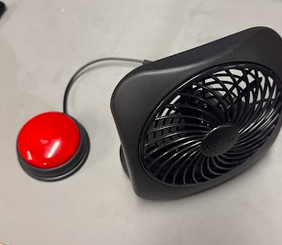BU student engineers adapt and donate 100 toys to kids with disabilities
By Patrick L. Kennedy
A challenge can be fun, but if you’re a kid with limited motor function, an ordinary child’s toy isn’t just challenging; it might be inaccessible. Just in time for the holidays, a team of BU student engineers is switch-adapting bubble machines and other toys for young children with disabilities. Applying their skills in reverse engineering, soldering, and small parts assembly to this task, the BU Mars Rover Club has added accessibility features to more than 100 toys. They’re donating the toys to the nonprofit Easterseals, who will distribute them to disabled kids for free around the holidays.
“The idea is for them to realize they’re not limited by their disabilities,” says Abdulaziz AlMailam (ENG’24,’26), a master’s student in electrical and computer engineering and president of BUMRC.
The club’s raison d’être is designing and building a Mars rover, which they’re entering in the 2025 University Rover Challenge in Utah next May. But after an assistive technology class at the BU Engineering & Product Innovation Center brought the issue of inaccessible toys to some club members’ attention, “We thought, ‘Hey, we have lots of engineers here. Let’s use our resources and adapt as many toys as we can,’” says AlMailam.

The club held a weeklong workshop last spring at BU’s Singh Imagineering Lab, drawing about 50 students from across the university, each adapting two toys under the direction of BUMRC members.
“We reverse-engineer it,” says AlMailam. “It’s basically circuits—you just have to figure out where the button connects and then solder two wires to it.”

The way ordinary toys come out of the factory, their switches are often tiny and hard to find. Switch-adapting involves connecting the original switch to a large, easy-to-push auxiliary button. “Think of a young amputee who couldn’t otherwise interact with this CoComelon bubble machine, which plays music and makes bubbles,” says AlMailam. “Well, now they can use their elbow to operate this big, round surface button. Now more people can use it.”
The newly adapted toys can help many disabled children engage in independent play, boosting their confidence.
The club was especially motivated to adapt and donate a large number of toys when they learned about the black market for the product. Bad actors, AlMailam explains, will adapt a toy and sell it at a steep mark-up to parents unaware of their options.
“The original CoComelon, for example, costs around 20 bucks, but these people will sell it for $120,” says AlMailam. “When the materials cost a few cents, and it takes five minutes to adapt. So we’re trying to put a dent in that market.”
The BUMRC members took inspiration from the BU College of Engineering’s emphasis on the Societal Engineer—producing professionals who will use their engineering skills to make a positive impact on the world.
“That was a big influence,” says AlMailam. “We said, ‘Hey, there are families that are in need, and we can help them.’”
